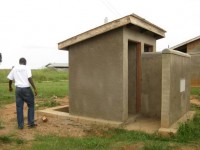Topics:
Sanitation
Composting
Urban Sustainability
Location: Kitgum, Uganda
Organizers:
| Europe:
|
| Uganda:
|
Background: With a population of 62,000, Kitgum Town is the administrative center of Kitgum District in norther Uganda. High population growth and an influx of refugees due to a two decade of civil war overwhelmed the city’s sanitation infrastructure and potable water supply.
Project: In 2006, the European Union-funded ROSA (Resource-Oriented Sanitation concepts for peri-urban areas in Africa) project was initiated in four pilot cities in east Africa, including Kitgum. The project was to last 3.5 years and joined five European institutions with two local partners in each African city, one of which was the local municipal government. In October of 2006, ROSA researchers undertook a baseline study of Kitgum’s sanitation situation, including greywater and wastewater reuse, and relevant policies and regulations. The information from the baseline study was disseminated to all parties, and culminated with a workshop for local leaders to decide on a viable sanitation management options given certain technical, social, and financial constraints. Participants decided that Urine-diverting dehydration toilets (UDDTs) would be the most suitable option as UDDTs produce compost: a major benefit agrarian economy. Additionally, UDDTs are cheap relative to installing connections to a central sewerage line.
UDDTs are a type of latrine with separate chambers for solid and liquid waste. Urine is typically diverted via a pipe outside of the latrine, while fecal matter is collected in a pit beneath the latrine. Faeces are covered with ash to dehydrate them. This dry environment greatly prevents bacterial growth and disease associated with human waste.
Following a year-long demonstration pilot with nine households, the project ended with 120 households trained and equipped with UDDTs. Composting trainings were held to ensure sanitary fertilizer production for food gardens.
Transferability: Most of the UDDTs were constructed with private funds. Throughout the ROSA project, the participation of town councils encouraged the continuation of the project beyond the funding period, though in the Kitgum case the town council has not taken a proactive role in scaling the project. The ROSA project was used as a case study to inform officials in Arusha, Tanzania, on strategies to extend waste management services to the city’s rapidly growing urban fringe.Sources:
Langergraber, Günter; Lechner, Markus; Müllegger, Elke. Sustainable Sanitation Practice. “The ROSA Project.” EcoSan Club Austria. Issue 4. July 7, 2010. http://www.ecosan.at/ssp/issue-04-the-rosa-project/issue-04
Source: SUSANA. “Household composting of organic waste and faeces: Kitgum Town, Uganda.” 2010. www.susana.org/docs_ccbk/susana_download/2-147-en-susana-cs-uganda-kitgum-town-composting-at-households-2011x.pdf
Although the project has been completed, the ROSA website remains online: rosa.boku.ac.at/index.php?option=com_frontpage&Itemid=1

